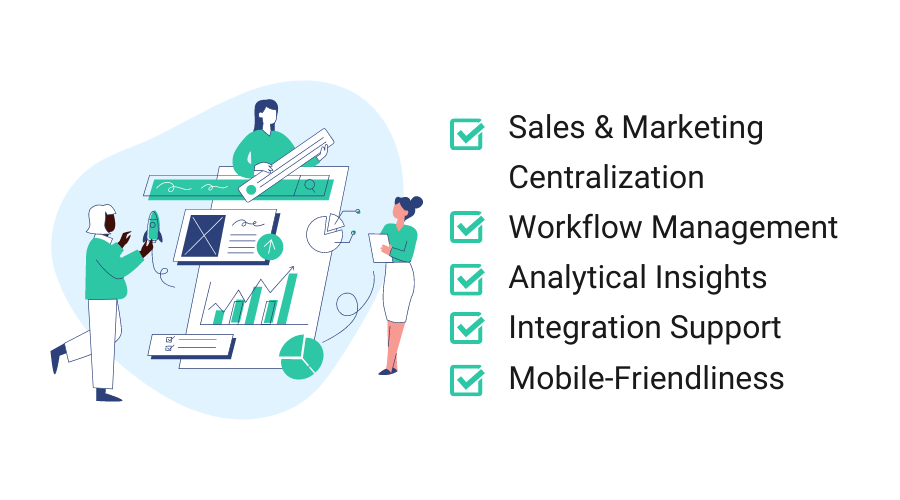At a time when consumers are faced with endless options and have access to myriads of information from the palms of their hands, attracting and retaining clients is ever more challenging.
The insurance sector is no exception, especially in the post-COVID world. In fact, according to Capgemini, 60% of insurance executives claimed that the pandemic has affected their firms’ customer acquisition efforts. Additionally, 40% cited a significant impact on retention.
So, customer relationship management is an area insurers shouldn’t overlook during this turbulent time.
While there are plenty of CRM solutions on the market, it can be difficult to discern which will truly solve your unique insurance business challenges. Hence, that’s what we will look at today.
We will discuss how you can determine whether your insurance firm actually needs CRM software, its benefits and must-have features, and what kind of CRM solution is best for your company. Let’s dive in.
Challenges a CRM Can Solve

At the core, CRM solutions exist to help businesses manage all interactions with potential clients and existing customers. Thus, the end goal of the technology is rather simple — streamline and improve business relationship processes to boost company growth.
Hence, an effective insurance CRM software can solve the following challenges for you:
Fragmented Information
Communication with prospects and customers may take place through your website’s chat feature, phone, email, or even text messages. Naturally, this leads to the fragmentation of data and important details which can be vital to closing a deal might get overlooked.
For insurance agents, having the key information centralized to allow for easy access is imperative and that’s precisely what CRM software can do.
Inefficient Workflows
Insurers deal with a lot of paperwork and manual data processing. After all, managing quote requests, policies, renewals, and claims requires ample documentation. This leads to inefficient workflows and slows down operations. However, with a CRM this doesn’t have to be the case.
Dropping Retention Rate
Another possible challenge you might be facing are dropping customer retention rates. A possible culprit of this phenomenon can be the inability to communicate with existing clients and establish a sense of loyalty.
You’ve got to keep reminding the people who have chosen you as their insurance provider why they should stay. That’s hard to do without a customer relationship management platform.
Few Leads and Conversions
Typically, it takes more than one interaction for someone to showcase interest in what your company offers. Similarly, several communication efforts are usually required to convert a prospect into a customer.
So, if you’re struggling with too few leads and conversions, perhaps it’s time to get a CRM software for your insurance agents and brokers. It’ll help them communicate across multiple channels and close the deals as soon as possible.
Gaining Control of Customer Engagements
What if every customer could deal with your single most effective sales or service person?
Of course, it’s important to mention that within the insurance sector, there are other tools that can help run your business.
Broker solutions, document management software, policy management platforms, and agency administration systems might have some overlapping features with a CRM. However, they don’t usually serve exactly the same purpose but rather complement each other to encompass all business processes.
Top 3 Advantages of Implementing a CRM
We’ve established the challenges you might be facing that a CRM can help solve, but let’s quickly go over the concrete benefits of this technology.
“CRM is the leading Enterprise Software segment as customer orientation is of great importance in digital business environments in order to stand out from the competition.”
— Statista
Higher Efficiency
By centralizing all of the important customer-related data and automating communication efforts, your insurance company can quickly observe higher levels of efficiency. Moreover, with fewer manual document processing, your agents won’t waste time on sorting papers and can focus on high-value tasks like one-to-one contact with clients.
Discover how we built Data Automation Software for an Insurance Consultant
Reliable Sales Insights
A CRM solution usually comes with useful analytical and report-generating features. They can help you predict performance and take proactive action when falling short on the needed KPIs.
Better Customer Service
With a CRM, your team will be able to personalize interactions with customers and offer unprecedented levels of customer care. Things will stop falling through the cracks, messages will always be answered, and clients will appreciate that.
5 Must-Have Features of Insurance CRM Software
Simply acquiring a customer relationship management platform isn’t enough for your agents to become more efficient and your business to observe immediate growth. Instead, you’ve got to ensure that the platform is truly suitable for your company. To do so, check that it has the following five features.

1. Sales and Marketing Centralization
First and foremost, your CRM needs to streamline sales and marketing initiatives and automate any repetitive tasks associated with them. Specifically, it should:
- Provide you with a unified view of customer data
- Help set up omnichannel communication efforts
- Serve as a central point for lead nurturing
- Automate marketing campaigns
- Aid in visualizing the sales pipeline
A CRM software that helps your insurance agency perform the above-mentioned tasks will become a true sales and marketing savior. Thus, when looking for the most suitable platform, don’t forget to check its full list of functions.
Discover how Velvetech helped Streamline Lead Generation With a Low-Code CRM
2. Workflow Organization
By keeping all of your customer interactions within a centralized system, CRM software can significantly impact workflow organization for your company. After all, with its help, you no longer have to access disjointed platforms to keep track of emails, phone calls, and other client-agent exchanges.
Additionally, for insurance agents, it can be difficult to always stay on top of every element of the sales process and keep organized so that nothing falls through the cracks. Thus, by embracing the full functionality of a CRM, this becomes much easier.
Since some CRM platforms let you sign and attach documents to contacts and deals, work organization can stop being burdensome. Instead, you always have access to files relevant to whichever prospect or client you’re in contact with.
Lastly, certain CRMs contain workflow automation capabilities that let you use intelligent logic and rules to get rid of repetitive tasks. For instance, by setting up an “if-then” chain of events you can ensure that the right action is carried out at each step of the sales process without agent involvement.
3. Analytical Insights
The third must-have feature of an insurance agency CRM software is the ability to provide analytics and generate reports.
You want to be able to get quick insights into the performance of your sales and marketing initiatives. Hence, user-friendly dashboards that accurately summarize all of the most important information are invaluable.
Besides letting you visualize data seamlessly, a CRM should also generate detailed reports for performance, trends, and customer behavior monitoring.
Whether you’re in the auto, health, or life insurance business, CRM software that uses predictive analytics and lets an agent identify customers at risk of churn will be indispensable.
4. Integration Support
There are multiple development challenges associated with building insurance software solutions. Integrating various platforms to work together coherently is one of them.
So, it’s imperative for insurance CRM software to have the ability to integrate with other solutions your agents use. Primarily, because this is how you can develop an all-encompassing system that will work to solve your unique business issues.
For example, if you want to handle all communication activities and document processing in a single window — you’ll need a document management system integrated with your CRM. If you’d like for every customer to deal with your most effective sales rep — it’d be great to have an AI-powered call analytics platform connected to your CRM.
In short, if you want to boost your CRM, it’s got to support integrations and not falter from functioning alongside additional tool
Find out how a FinTech company benefited from CRM Integration with Various Systems
5. Mobile-Friendliness
Lastly, it’s essential that your solution is mobile-friendly. Mobile apps are only growing in popularity, and the chances are high that your agents are often on the go, but with smartphones in their pockets.
Thus, implementing a CRM that has the same functionality on a mobile phone as on the web, is of utmost importance for the long-term success of your insurance company.
Learn more about Mobile Insurance Applications
Choosing the Right CRM Acquisition Approach

Now that you know the features to look out for within a CRM, it’s important to discuss the two separate development approaches you can choose from — custom development or a ready-made solution.
Custom Insurance CRM
Custom CRM development is great for companies that are looking for a tool that will fit perfectly with their existing business tools and solve their unique challenges.
Typically, custom-built solutions end up being truly one of a kind and unlike any your competitors may have. Hence, despite the at times higher costs and a longer implementation process, the advantages of custom development lead insurance firms to choose this route.
Uncover How Much It Costs To Develop Custom Software
Ready-Made Insurance CRM
On the other hand, you can choose to go with an out-of-the-box solution like the HubSpot or low-code CRM Creatio that can be ready for use much faster than a custom tool.
It’s important to note, that even when you opt for a ready-made CRM, it doesn’t mean you won’t be able to adjust it to your needs. Of course, the spectrum of customization isn’t going to be as expansive as with tailored tools, but you’ll still get the chance to make modifications.
Acquire Your Solution
Insurance companies have a lot to gain from developing CRM software that is effective and easy to use.
Whether you want to optimize existing workflow processes, centralize sales and marketing initiatives, or get comprehensive customer behavior insights, a CRM is here to help.
At Velvetech, we have years of experience in CRM software implementation and customization to fit our clients’ needs. So, if you’re looking for a partner to take the IT work off of your hands — don’t hesitate to reach out.































